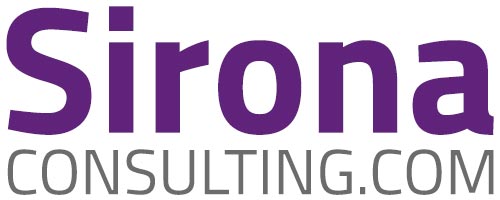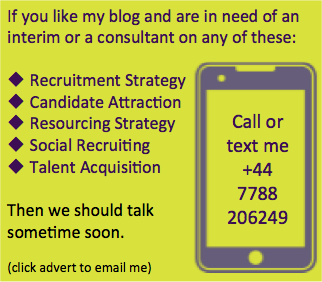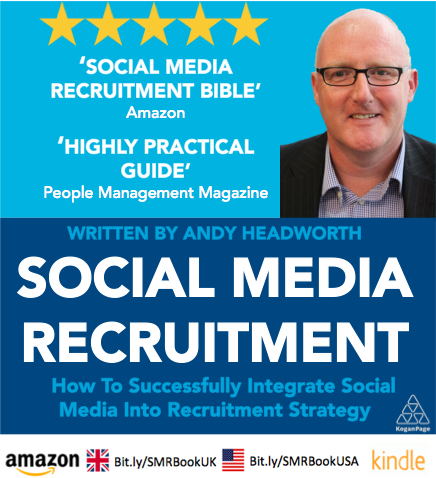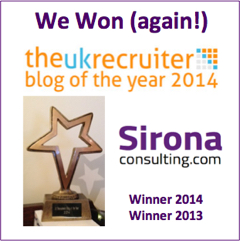A Social Media Guidelines template that you can use for your company
Sirona Consulting - my consulting business - is currently getting many inquiries from companies curious about social recruiting, and whether they should be using social media in their business. What is interesting is that they are a mix of large organisations, recruitment companies and small businesses (who just want to know about social media as a marketing tool - slightly off sector, but the same principals!).
So consequently, I have been having a good number of conversations about social media and the implications in the workplace!
When I start by asking the first few fact finding questions - I blogged recently about this - I seem to be getting a common response from the real social media newbies.
They are very fearful of losing control. They want to know what they can do to mitigate some of the horror stories they read about in the press (typically about Facebook, I have to say!)
Of, course there is nothing a company can do if a malicious or disgruntled employee wants to write something bad or revealing about your company (but then they could do that anyway -out of work hours - just by setting up a Facebook Group or setting up a new Twitter account, and spreading the words, if they felt that way inclined!)
But if you want employees to participate in social media on your behalf at work, then you should be providing them with a series of guidelines to protect both them and your company. Taking this a stage further, you can then make agreeing to these guidelines, a mandatory part of their employment contract, with disciplinary implications if they step out of the guidelines.
Now there are already huge numbers of corporate social media guidelines out there on the Internet to take a look at - Laurel Papworth has put together an awesome list of these on her blog - but (trying to keep this simple) here are a relatively simple set of social media guidelines that you could start with that were created by Todd Defren.
Here is a A Social Media Guidelines Template that you can use for your company:
These guidelines apply to (COMPANY) employees or contractors who create or contribute to blogs, wikis, social networks, virtual worlds, or any other kind of Social Media. Whether you log into Twitter, Yelp, Wikipedia, MySpace or Facebook pages, or comment on online media stories — these guidelines are for you.
While all (COMPANY) employees are welcome to participate in Social Media, we expect everyone who participates in online commentary to understand and to follow these simple but important guidelines. These rules might sound strict and contain a bit of legal-sounding jargon but please keep in mind that our overall goal is simple: to participate online in a respectful, relevant way that protects our reputation and of course follows the letter and spirit of the law.
1. Be transparent and state that you work at (COMPANY). Your honesty will be noted in the Social Media environment. If you are writing about (COMPANY) or a competitor, use your real name, identify that you work for (COMPANY), and be clear about your role. If you have a vested interest in what you are discussing, be the first to say so.
2. Never represent yourself or (COMPANY) in a false or misleading way. All statements must be true and not misleading; all claims must be substantiated.
3. Post meaningful, respectful comments — in other words, please, no spam and no remarks that are off-topic or offensive.
4. Use common sense and common courtesy: for example, it’s best to ask permission to publish or report on conversations that are meant to be private or internal to (COMPANY). Make sure your efforts to be transparent don't violate (COMPANY)'s privacy, confidentiality, and legal guidelines for external commercial speech.
5. Stick to your area of expertise and do feel free to provide unique, individual perspectives on non-confidential activities at (COMPANY).
6. When disagreeing with others' opinions, keep it appropriate and polite. If you find yourself in a situation online that looks as if it’s becoming antagonistic, do not get overly defensive and do not disengage from the conversation abruptly: feel free to ask the PR Director for advice and/or to disengage from the dialogue in a polite manner that reflects well on (COMPANY).
7. If you want to write about the competition, make sure you behave diplomatically, have the facts straight and that you have the appropriate permissions.
8. Please never comment on anything related to legal matters, litigation, or any parties (COMPANY) may be in litigation with.
9. Never participate in Social Media when the topic being discussed may be considered a crisis situation. Even anonymous comments may be traced back to your or (COMPANY)’s IP address. Refer all Social Media activity around crisis topics to PR and/or Legal Affairs Director.
10. Be smart about protecting yourself, your privacy, and (COMPANY)’s confidential information. What you publish is widely accessible and will be around for a long time, so consider the content carefully. Google has a long memory.
Obviously this is a simple template, and when you check out Laurel's lengthy post with 40+ other social media guidlelines on you will see the complexity.
If you are wondering how you can communicate this to your employees, then one Australian company, Telstra, have done a really great job with a series of videos here.
I hope this has ben of help, and if there are other guidlelines that should be noted, then please add them in the comments below - I would really like to see them.

If you like reading this blog, then click on the orange RSS icon here and get the latest Sirona Says posts delivered to your RSS reader or your inbox the moment they come out.












